Key takeaways:
- Self-care and mental health support are essential for emotional recovery during the postpartum period, helping new parents navigate overwhelming feelings.
- Understanding physical changes and prioritizing nutrition, like hydration and nutrient-dense foods, significantly aid in physical recovery and overall well-being.
- Creating a supportive environment and communicating openly with healthcare providers enhance postpartum care, promoting empowerment and effective healing.

Understanding postpartum care principles
Understanding postpartum care principles is crucial for both physical and emotional recovery after childbirth. I remember feeling overwhelmed with the intensity of my emotions after having my first child. It struck me how vital it is to be gently and holistically cared for during this transformative time, not just the physical healing but the emotional support as well.
One principle that stands out is the focus on self-care. Have you ever found yourself so caught up in caring for your newborn that you forget to care for yourself? I certainly did. I learned that dedicating time, even just a few minutes a day, to rest or indulge in something I loved—like a warm cup of tea or a brief walk outside—made a world of difference in my mental well-being.
Education on postpartum bodies and what’s normal is another cornerstone of care that I find essential. I vividly recall the mixed feelings I had when learning about the range of physical changes after childbirth. Understanding what to expect helped alleviate some of my anxiety. Wouldn’t it be comforting if every new parent had access to informative resources that normalize these experiences? Knowledge really fosters a sense of empowerment during such a vulnerable phase.
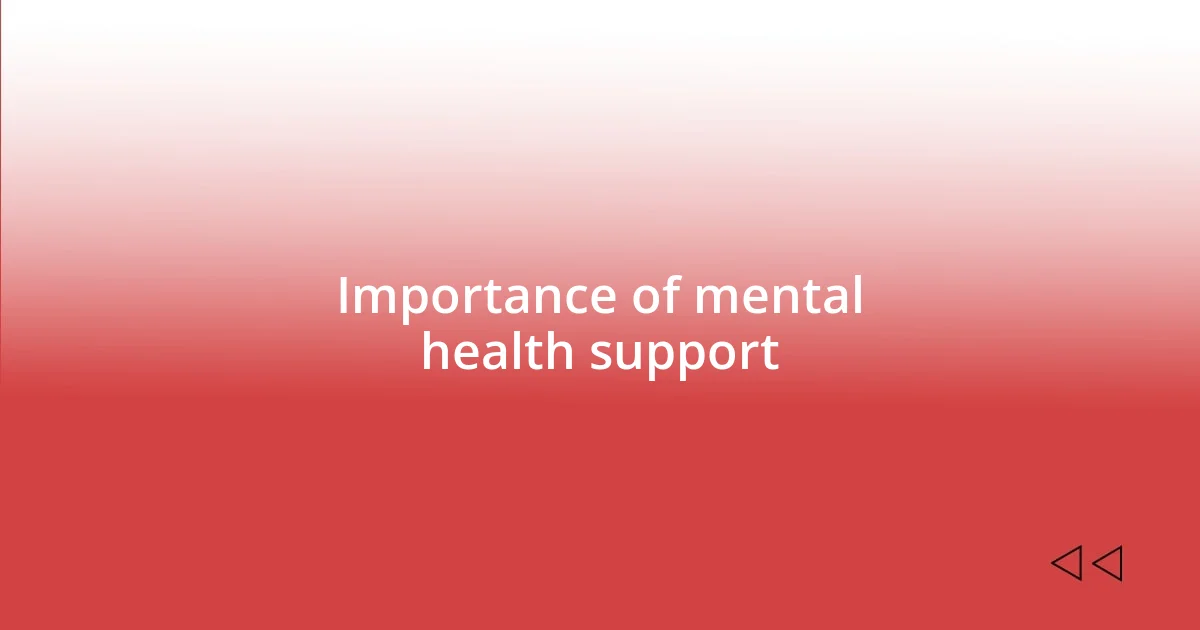
Importance of mental health support
Mental health support is absolutely essential during the postpartum period. After the whirlwind of childbirth, I found myself grappling with unexpected feelings of anxiety and sadness. It was a struggle to reconcile the joy of my new arrival with the overwhelming emotions that seemed to take over at times. Having access to mental health resources and simply knowing that it was okay to seek help was invaluable. This support not only validated my emotions but also provided practical tools to navigate this challenging time.
Consider these crucial aspects that highlight why mental health support is so important:
- Validation of Feelings: Knowing that what I experienced was common among new parents helped me feel less isolated.
- Coping Strategies: Counseling offered me valuable coping strategies, like mindfulness exercises, that I still use today.
- Building a Support Network: Connecting with other parents facing similar challenges turned out to be a lifesaver, transforming my feelings of loneliness into shared experiences.
- Identifying Warning Signs: Early intervention is key; understanding the signs of postpartum depression can lead to timely support, ensuring no one feels they have to struggle alone.
Every story matters, and sharing experiences can foster a stronger support system for everyone involved.
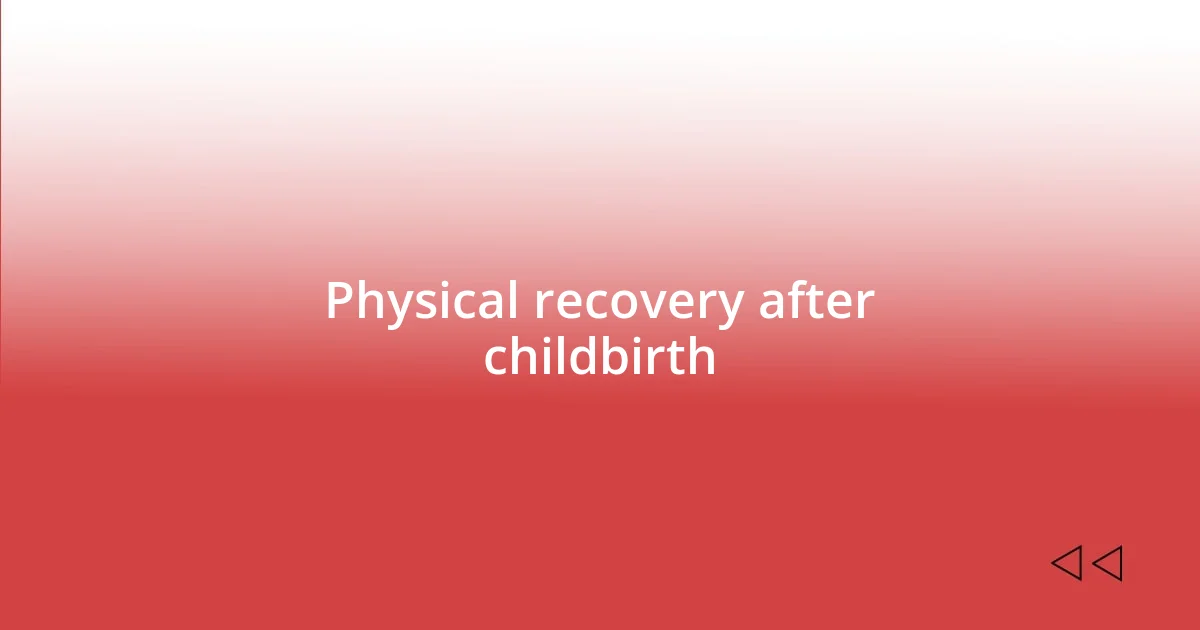
Physical recovery after childbirth
Physical recovery after childbirth can be quite an intricate journey. I distinctly remember the first time I tried to stand after delivery; it felt like each muscle in my body was shouting in protest. This experience underscored how essential it is for new mothers to listen to their bodies. Our bodies have just accomplished something monumental, and they deserve gentle care and patience during this recovery phase.
It’s not just about healing from physical strains but also about understanding the bodily changes that occur postpartum. For instance, lochia—which is the vaginal discharge following birth—can take weeks to regulate. When I first experienced this, it caught me by surprise. Knowing what to expect helped me approach these changes with less anxiety and more understanding. Being informed allowed me to ease into my recovery while keeping the focus on nurturing myself during this time.
I always advise new parents to prioritize rest and movement gently. Simple activities like short strolls with the baby can facilitate blood flow and improve emotional well-being. Have you ever noticed how taking a moment for yourself, even just to breathe deeply and stretch, can lift your spirits? Those small actions? They can spark rather significant progress in the recovery journey.
| Aspect | Details |
|---|---|
| Physical Healing | Rest is crucial; listen to your body as it recovers from childbirth. |
| Understanding Changes | Learn about what to expect, like lochia, to reduce anxiety during recovery. |
| Gentle Movement | Incorporate light walks or stretches to improve circulation and emotional health. |
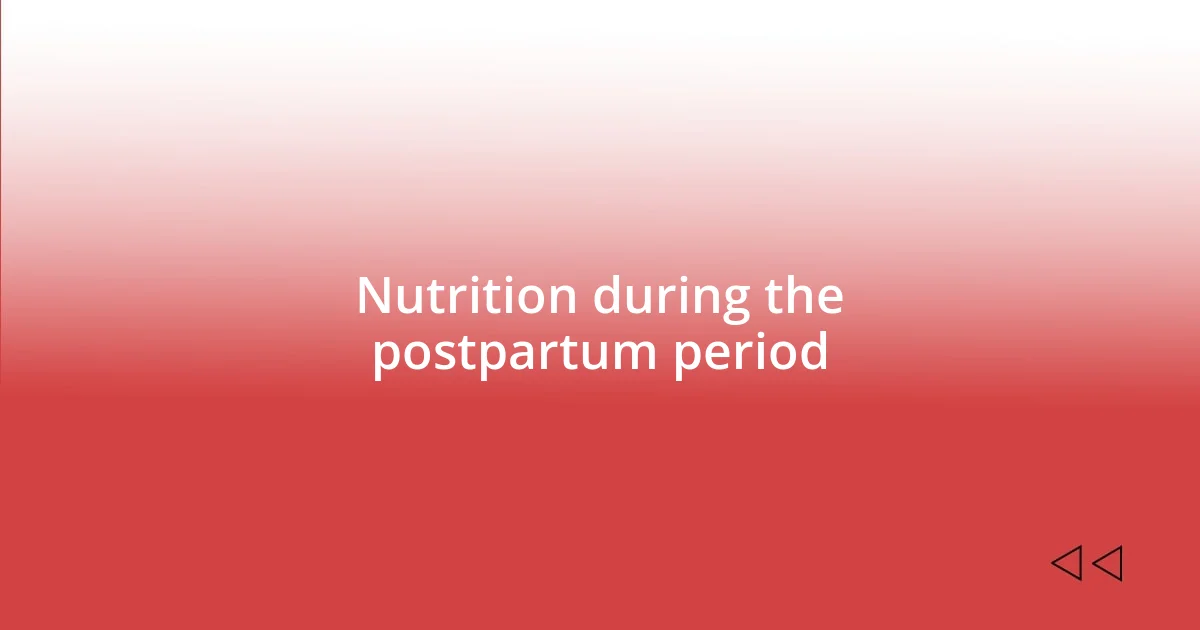
Nutrition during the postpartum period
Nutrition during the postpartum period
Nutrition during the postpartum period is pivotal for both physical recovery and emotional well-being. I can’t stress enough how nourishing my body played a role in my mood and energy levels. Choosing whole, nutrient-dense foods—like leafy greens and lean proteins—helped me feel more balanced, even on those days when exhaustion threatened to take over. Have you ever noticed how what you eat can directly affect how you feel?
During my own experience, I made it a point to include plenty of hydration in my postpartum routine. Water became my best friend! Not only did it help with milk production, but it also aided in flushing out toxins and keeping my energy up. I remember sipping herbal teas while cradling my newborn—it was a tiny moment of self-care amidst the chaos. What little changes could you make today to better nourish yourself?
Whole grains and healthy fats should also be staples in your diet. I discovered that incorporating foods like avocados and nuts provided the sustained energy I desperately needed during those marathon feeding sessions. There’s something incredibly rewarding about fueling your body right, especially when you’re nurturing a little one. I often reflected on how these simple dietary choices supported my overall recovery—it’s about caring for yourself just as much as caring for your baby.
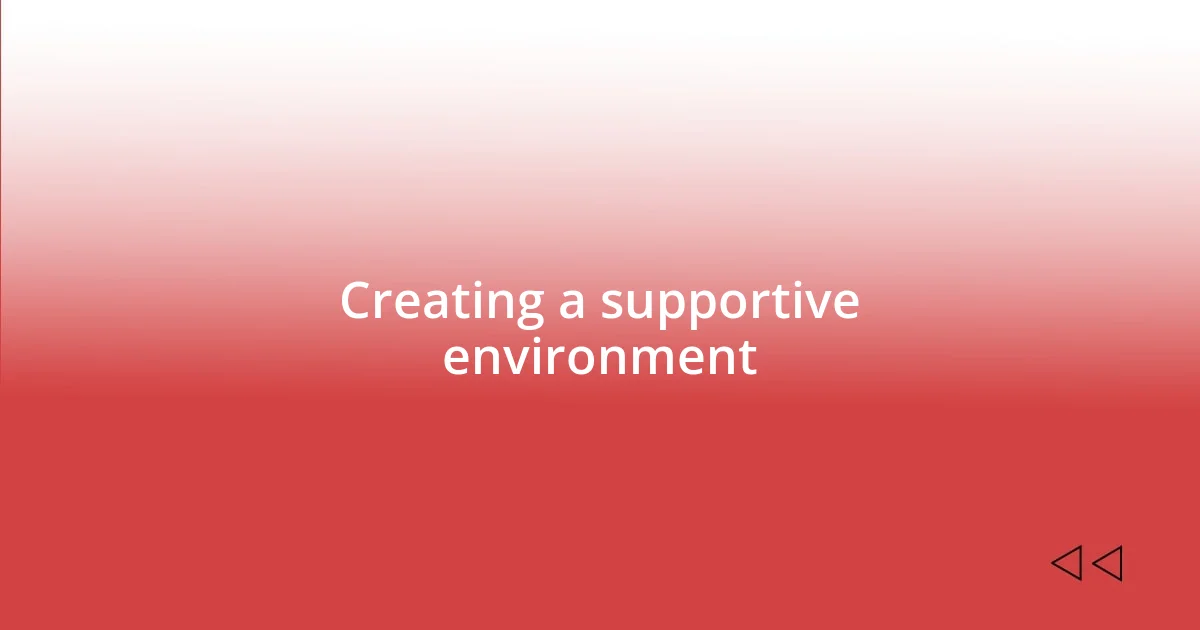
Creating a supportive environment
Creating a supportive environment is vital for postpartum recovery, and I truly believe that establishing a nurturing space can make all the difference. When I returned home with my newborn, I made it a point to invite friends and family over—not just for visits, but for help. Perhaps one of the best feelings was when a close friend came over and took charge of meal prep. It was such a relief to see delicious, home-cooked meals on the table instead of having to think about what to eat. Isn’t it amazing how a simple gesture can lift your spirits?
It’s also important to cultivate a calming atmosphere at home. Soft lighting, soothing music, and even setting up a cozy corner with pillows can create an inviting space for rest and relaxation. I remember tucking myself into a soft blanket, cradling my baby, and soaking in those peaceful moments. Sometimes, just having that little sanctuary can help ease the overwhelming sensations that come with new motherhood. Have you created a little haven for yourself?
Lastly, surrounding yourself with a network of support is crucial. I found that joining a local parenting group not only provided a sense of community but also offered practical advice from other new moms. Sharing experiences and stories in a safe space highlighted that I was never alone in the challenges of postpartum life. It’s comforting to know that others share in this beautiful chaos. So, who can you reach out to in your own community?
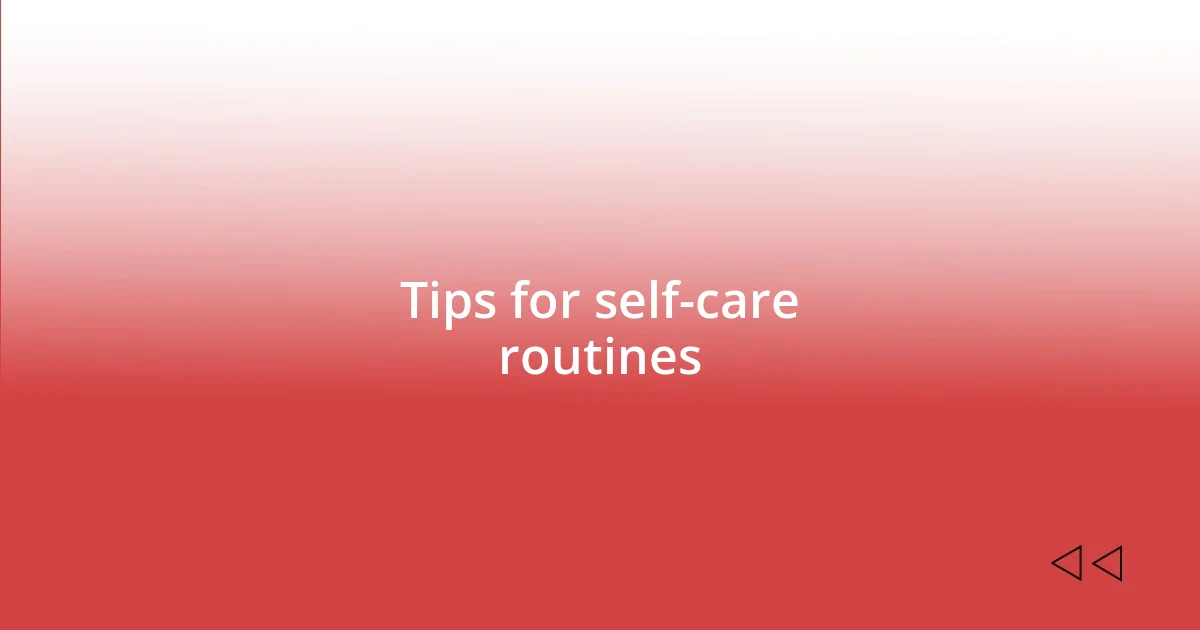
Tips for self-care routines
Taking time for self-care can feel like a luxury you can’t afford, but I learned that it’s essential, especially during the postpartum period. I started setting aside just ten minutes each day for quiet reflection, and it truly transformed my mood. Have you ever tried sitting in silence, even for just a few minutes? I often found that those moments allowed the chaos to fade, redirecting my focus back to what truly mattered.
One thing that really helped me was mapping out a simple self-care routine. I made a list of activities that brought me joy, like reading a chapter of a book or practicing gentle yoga. On particularly tiring days, I’d take a quick shower with my favorite scented soap – it felt refreshing, both physically and mentally. What small rituals could you incorporate into your day that would make you feel more like yourself?
I also discovered the power of movement in my self-care routine. At first, a simple stroll with my baby in the park felt daunting, but the fresh air did wonders for my spirit. I realized that stretching my legs while soaking in the surroundings was a form of therapy that I desperately needed. Have you found a movement that connects you to your body during this busy time? Embracing these little self-care practices helped me reclaim a piece of myself, making the journey through motherhood feel a whole lot lighter.
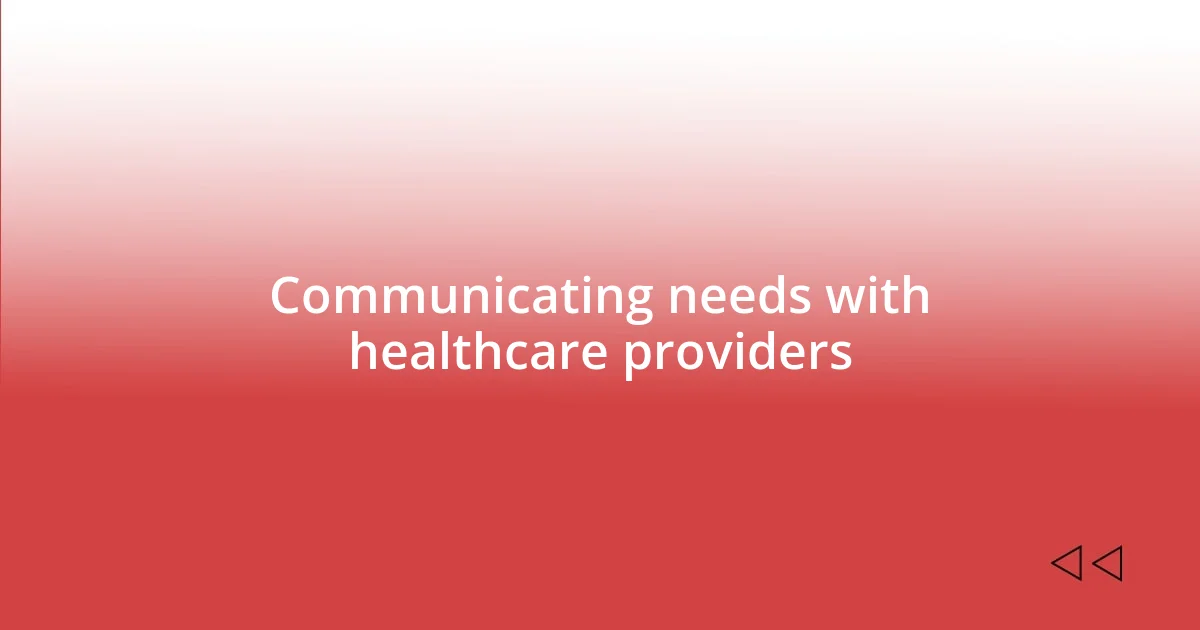
Communicating needs with healthcare providers
Communicating your needs with healthcare providers is one of the most crucial aspects of postpartum care. I remember sitting in the doctor’s office for my follow-up appointment, feeling both overwhelmed and anxious. It dawned on me that being honest about my feelings – whether it was about physical pain or emotional struggles – was key. Have you ever felt hesitant to voice your concerns? I found that opening up made it easier for my healthcare provider to tailor their advice specifically to my needs.
Additionally, I learned that preparation is incredibly helpful. Writing down my questions before appointments helped me articulate my needs clearly, ensuring I didn’t forget anything important in the moment. During one visit, I spoke about my difficulties in breastfeeding, and the provider immediately offered practical solutions without judgment. It was empowering to realize that proactive communication could lead to valuable support and guidance.
Lastly, don’t underestimate the power of follow-up. After that first conversation, I made it a habit to check in about my progress, which showed my healthcare provider that I was taking charge of my healing process. Whether it’s a phone call, email, or return visit, staying engaged has made all the difference in my care. How do you keep the lines of communication open with your providers? I’ve discovered that it creates a collaborative atmosphere that fosters better outcomes for both of us.















